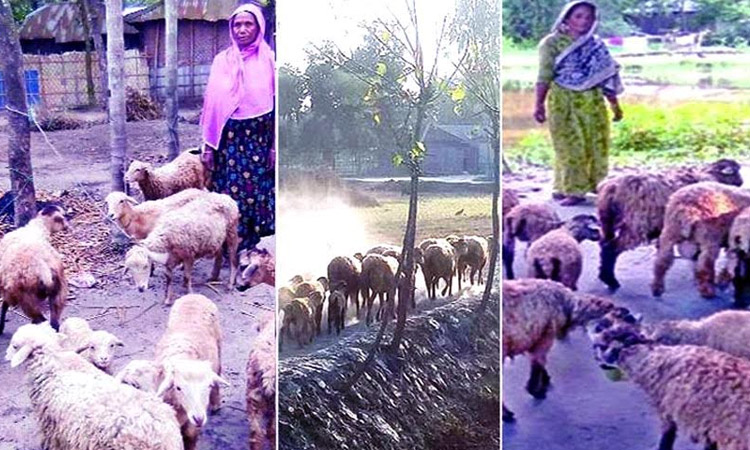News Flash
News Flash

By Md Mamun Islam
RANGPUR, April 21, 2025 (BSS) - Nearly 8,000 poor and distressed rural women in the district are successfully becoming self-reliant through sheep rearing as a popular initiative to change their fortune.
Once struggling to make ends meet, these women are now leading comfortable lives and supporting their families with newfound confidence.
The Department of Livestock officials said that sheep farming is rapidly expanding among rural women, significantly contributing to local meat production and fulfilling the community's protein needs.
Talking to BSS, several women shared their inspiring stories of rising from poverty through sheep rearing.
Rashida Begum, a housewife from Laxmipur village in the Ekorchali union of Taraganj upazila, recalled how she and her husband, day labourer Mansur Ali, barely survived on daily wages after marrying 43 years ago.
"I gave birth to two sons and a daughter while living in extreme hardship," Rashida said.
Sixteen years ago, she borrowed Taka 500 from her brother and bought a female sheep for Taka 365.
Just six months later, the sheep gave birth to four cubs and another four cubs followed six months after that.
Her flock continued to grow every year, eventually allowing her to sell sheep and cover all her household expenses.
Today, Rashida owns 40 sheep. Her children are grown and married and both her sons now earn independently as vegetable traders.
The family has leased cultivable land and built a house on their own property. Her husband no longer works as a laborer; instead, the couple spends their time managing their sheep.
Rashida's husband Mansur Ali said "We're planning to establish a modern sheep farm in our yard with help from the Upazila Livestock Office."
Inspired by Rashida's success, many of her neighbors Khaleda Yasmin, Rahima Begum, Sharifa Begum, Ambia Begum, Khadija Khatun, and others have also taken up sheep rearing.
At present, around 100 women in Laxmipur are involved in sheep farming, slowly transforming the village into a hub of sheep rearing.
Talking to BSS, Taraganj Upazila Livestock Officer Agriculturist Dr. KM Iftekharul Islam said the Upazila Department of Livestock provides necessary assistance and vaccines to sheep in village Laxmipur free of cost.
Like Rashida, Monira Begum, a housewife from Char Gannarpar village on the banks of the Teesta River in Gangachara Upazila, said she has become a self-sufficient woman by raising sheep.
Monira and her husband Alauddin Mia, a farm laborer, once struggled to feed their two daughters. Fifteen years ago, she somehow managed to buy three sheep.
"Each sheep gave birth to three or four cubs every six months. This cycle continued and within a few years, everything changed," Monira said.
Now, Monira owns 40 sheep and has built a solid home. Every day, she grazes her flock in the nearby char areas.
"I feel a little sad when I have to sell some of them or when there's not enough space at home," she added.
District Livestock Officer Dr. Md. Abu Sayeed today told BSS that the reproduction rate of sheep has increased substantially in the district following various steps taken by the government.
The district's sheep population now stands at 47,943 and it's growing each year.
He added that the Department of Livestock is also working to promote the commercial use of sheep hair in making carpets, blankets, mats, and other products.
Sheep meat is soft, juicy, easily digestible and high in protein and energy and relatively low in harmful fat and cholesterol.
"It's also high in sodium, potassium, copper, and phosphorus, important for children's growth, tissue repair, and immune function. The meat's vitamins A, E, and C act as antioxidants, helping prevent cholesterol buildup in blood vessels," Dr Sayed added.